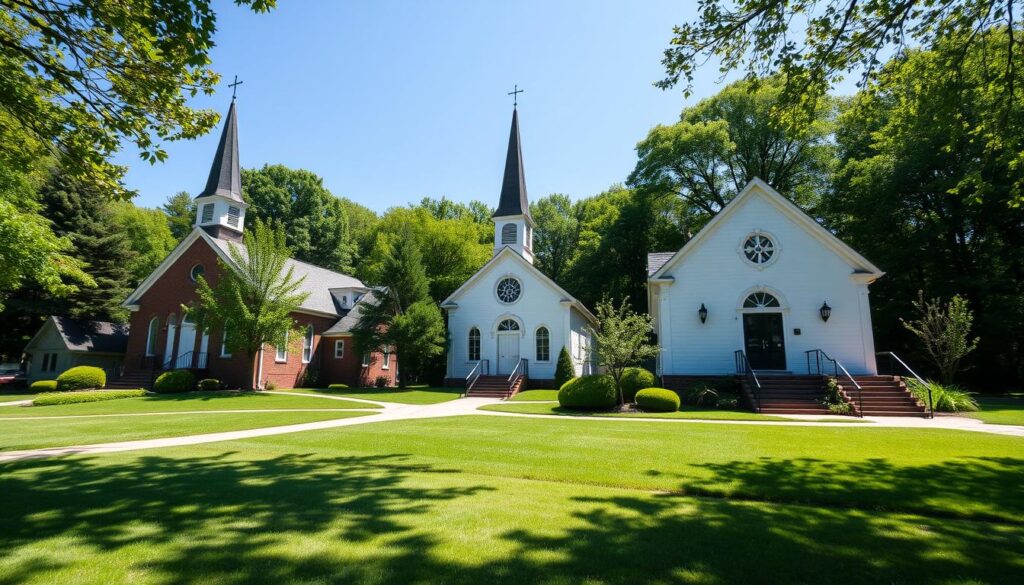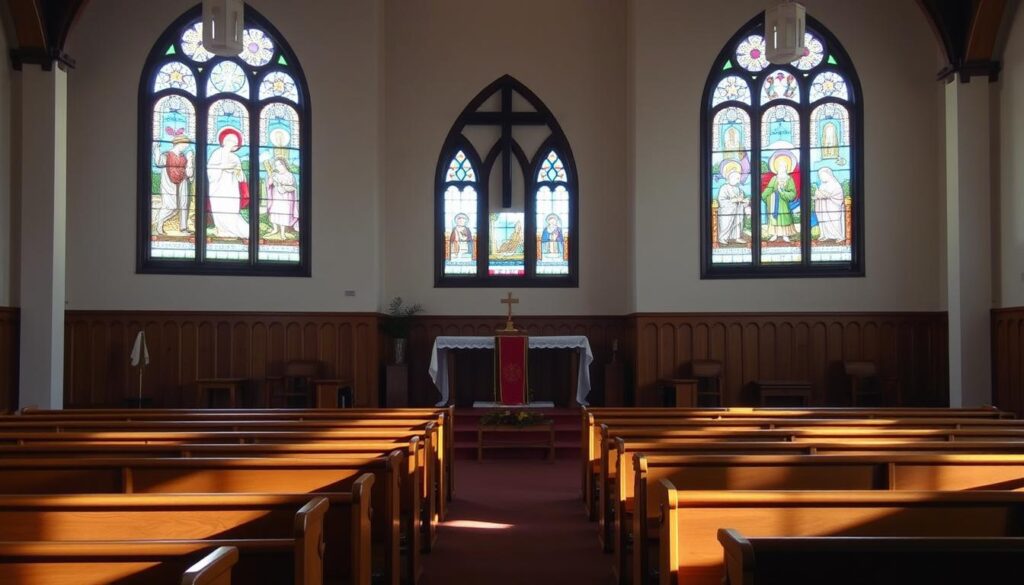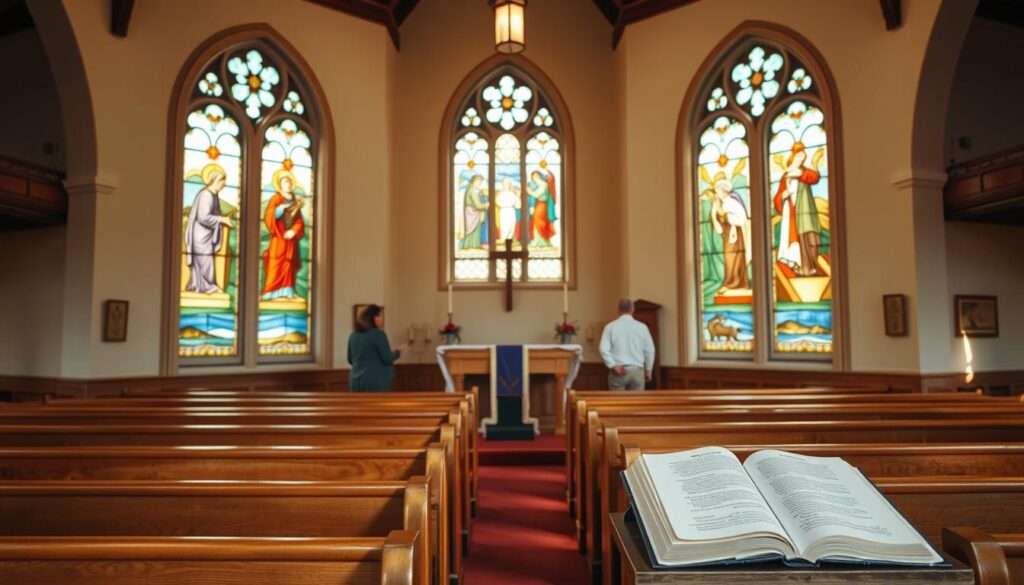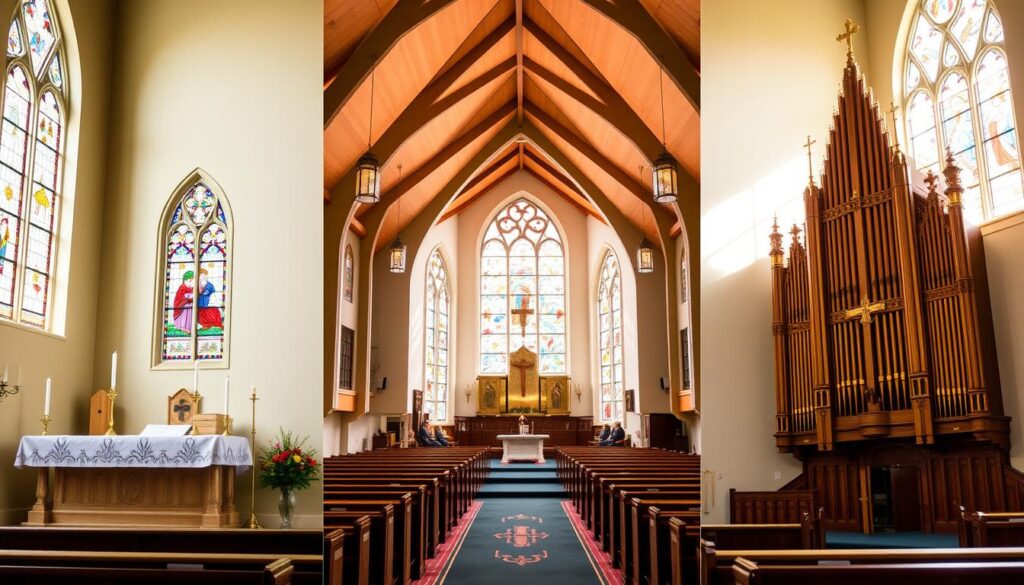The Lutheran, Methodist, and Episcopal churches are big names in American Protestantism. They share a common Protestant heritage. Yet, they have their own unique beliefs, ways of worship, and church governance. Knowing these differences helps us understand the rich tapestry of American Protestantism.

What makes these denominations unique? Their histories and beliefs shape their identities in the Christian world. This article explores the distinct features of Lutheran, Methodist, and Episcopal faiths. We’ll look at their historical backgrounds, core beliefs, and today’s challenges.
Key Takeaways
- Lutheran, Methodist, and Episcopal churches have distinct theological perspectives and worship practices.
- The Lutheran Church-Missouri Synod represents a more conservative branch, while the Evangelical Lutheran Church in America is more modernist.
- Methodist churches emphasize personal conversion and the sufficiency of Scripture, while Episcopal churches have a more diverse theological spectrum.
- The three denominations vary in their approaches to church governance, sacraments, and the interpretation of biblical authority.
- Understanding these differences can provide valuable insights into the diverse landscape of American Protestantism.
Introduction to Protestant Denominations
Historical Context and Significance
Protestantism started in the 16th century as a reform within the Catholic Church. Leaders like Martin Luther questioned some Catholic teachings. This led to the creation of many Protestant churches.
The Lutheran, Methodist, and Episcopal churches are key among these. They have greatly influenced the religious scene in the United States.
Overview of Major Theological Distinctions
Each Protestant tradition has its own history, beliefs, and church structure. They all agree on the importance of the Bible and faith. But, they have different views and practices.
Lutherans believe the Bible is the only authority. Methodists focus on personal conversion and holiness. Episcopalians have a unique structure and liturgy, thanks to their Anglican roots.
These differences have shaped Protestant Christianity in the U.S. They have made the country’s religious scene diverse and rich.
| Denomination | Historical Origins | Theological Emphasis | Governance Structure |
|---|---|---|---|
| Lutheran | Emerged from the teachings of Martin Luther | Sola scriptura, justification by faith alone | Decentralized structure with local congregations |
| Methodist | Influenced by the teachings of John Wesley | Emphasis on personal conversion and holiness | Hierarchical structure with bishops and conferences |
| Episcopal | Rooted in the Anglican tradition, separated from the Catholic Church in the 16th century | Sacramental theology, liturgical tradition | Hierarchical structure with bishops and dioceses |

The history and beliefs of these Protestant denominations have deeply influenced the U.S. They have made Christianity diverse and sparked ongoing discussions within the Christian community.
Lutheran Beliefs and Practices
Lutheranism is a big branch of Protestant Christianity. It comes from the teachings of Martin Luther, a German theologian. The main ideas are sola scriptura and justification by faith alone.
Teachings of Martin Luther
Martin Luther’s ideas changed the Catholic Church’s teachings. He believed in the priesthood of all believers. This means everyone can interpret Scripture, not just the hierarchy.
Luther also didn’t agree with the Catholic idea of transubstantiation. This idea says the bread and wine in communion become Christ’s body and blood.
Sola Scriptura and Justification by Faith Alone
Lutherans believe in sola scriptura. They think the Bible is the only authority for faith and practice. They don’t rely on tradition or the Pope’s teachings.
They also believe in justification by faith alone. This means salvation comes from faith in Christ, not good deeds or rituals.
These beliefs shape Lutheran worship, sacraments, and theology. They make Lutheranism different from other Protestant groups like Methodism and Episcopalianism.

Methodist Beliefs and Practices
Methodism started in the 18th century as a reform within the Church of England. It was led by John Wesley and his brother, Charles. This tradition focuses on personal conversion and holiness. It emphasizes God’s grace as a transformative power.
Methodists believe in free will, unlike Calvinists. They stress social justice and good works as signs of faith. John Wesley’s teachings deeply influence Methodist beliefs. He believed in achieving “Christian perfection” through sanctification.
Influence of John Wesley’s Teachings
At the core of Methodist theology is prevenient grace. This is the belief that God’s grace comes first, enabling people to respond to salvation. Wesley said this grace is for everyone, and it’s up to each person to accept or reject it.
- Methodists value personal conversion experiences. These are when people consciously accept God’s grace and commit to Christ.
- Wesley’s teachings on holiness and Christian perfection are key to Methodist theology.
- Methodists also emphasize the role of reason and experience in understanding Scripture, alongside the Bible’s authority.
Emphasis on Personal Conversion and Holiness
The Methodist tradition focuses on the individual’s relationship with God and the power of grace. Methodists see salvation as a journey of sanctification. They strive to grow in holiness and become more like Christ.
| Methodist Beliefs | Key Characteristics |
|---|---|
| Personal Conversion | Methodists stress the importance of a personal, conscious decision to accept God’s grace and commit to Christ. |
| Holiness and Sanctification | Methodists believe in achieving “Christian perfection” through a lifelong journey of growing in holiness and Christ-likeness. |
| Social Justice | Methodists are committed to social justice and good works as expressions of their faith. |

“The Methodist Church has always been a movement of social and spiritual renewal, calling people to personal conversion and a life of holiness.” – Rev. Dr. Susan Henry-Crowe, General Secretary of the United Methodist Church’s General Board of Church and Society
Episcopal Beliefs and Practices
The Episcopal Church in the United States is part of the worldwide Anglican Communion. It traces its roots to the Church of England. Episcopalians believe in a variety of things, but they all agree on one thing: the importance of bishops in church leadership.
Anglican Roots and Episcopal Governance
The Episcopal Church’s Anglican heritage shows in its liturgical worship. This worship is full of ritual and ceremony. The Eucharist, or Holy Communion, is at the heart of Episcopal worship. It shows the church’s belief in the real presence of Christ in bread and wine.
Episcopalians value the role of bishops a lot. Bishops ordain clergy, confirm and bless the faithful, and oversee their dioceses. This structure is key to the Episcopal Church and its Anglican roots.
| Denomination | Membership Estimates | Theological Stance |
|---|---|---|
| Episcopal Church | Around 2 million members | Theologically diverse, with a range of beliefs and practices, but generally characterized by social and theological liberalism |
| Lutheran Church-Missouri Synod (LCMS) | Around 2 million members | Conservative views, supporting traditional marriage and not ordaining non-heterosexual individuals |
| Evangelical Lutheran Church in America (ELCA) | Around 4 million members | Officially supports same-sex marriage and the ordination of non-heterosexual individuals |
The Episcopal Church’s diverse beliefs reflect its Anglican roots. This diversity has sparked debates, especially on social justice, sexuality, and Scripture interpretation.
Worship and Liturgical Traditions
The Lutheran, Methodist, and Episcopal denominations each have their own worship styles. These styles reflect their beliefs and history. Knowing these differences helps us understand the variety in Protestant Christianity’s worship.
Lutheran Worship Style
Lutheran worship focuses a lot on preaching. The sermon is the main part of the service. Lutherans follow sola scriptura, believing the Bible is the only authority. This shapes their worship.
They also value liturgical elements like reading Scripture and celebrating the Eucharist. But the sermon is most important.
Methodist Worship Practices
Methodists have different worship styles. They range from modern praise to traditional liturgy. John Wesley’s teachings on personal conversion and holiness influence their worship.
Some Methodist churches are informal and spontaneous. Others stick to a more structured, traditional format.
Episcopal Liturgy and Communion
Episcopal worship is known for its ritual and ceremony. The Eucharist (communion) is the main act of worship. The Episcopal Church uses the Book of Common Prayer to guide their services.
Their liturgy is formal and emphasizes the sacraments. It’s a reverent and structured worship experience.

“The liturgy is the work of the people, and the people have a role to play in it. It’s not just something that’s done to them or for them, but something in which they participate actively and meaningfully.” – Robert Webber, “Evangelicals on the Canterbury Trail”
Sacraments and Ordinances
The Lutheran, Methodist, and Episcopal denominations have different views on sacraments. Lutherans see two main sacraments: baptism and the Eucharist. Methodists, however, call these two rites ordinances, not sacraments. The Episcopal Church, following the Anglican tradition, recognizes seven sacraments, including baptism, confirmation, and the Eucharist.
Lutheran Sacraments
Lutherans follow Martin Luther’s teachings, believing in sola scriptura (Scripture alone). They see only two sacraments – baptism and the Eucharist – as Christ’s direct commands in the Bible. They disagree with the Roman Catholic Church’s seven sacraments, seeing them as unbiblical.
Methodist Ordinances
The Methodist tradition, shaped by John Wesley, sees baptism and the Eucharist as ordinances. Methodists believe these rites are important, but they don’t hold the same theological weight as the Roman Catholic or Episcopal Church.
Episcopal Sacraments
The Episcopal Church, part of the Anglican Communion, recognizes seven sacraments, like the Roman Catholic Church. These include baptism, confirmation, and the Eucharist. The Episcopal Church places a strong emphasis on liturgy and the role of bishops.
| Denomination | Sacraments/Ordinances |
|---|---|
| Lutheran | 2 sacraments: baptism and Eucharist |
| Methodist | 2 ordinances: baptism and Eucharist |
| Episcopal | 7 sacraments: baptism, confirmation, Eucharist, matrimony, ordination, reconciliation, anointing of the sick |
The differences in sacraments and ordinances among these Protestant denominations show their unique theological views and histories. These differences add to the variety in Christian worship and practice.

Church Governance and Leadership
The Lutheran, Methodist, and Episcopal denominations have different ways of leading their churches. The Episcopal Church has bishops as the top leaders. Lutherans give more power to local churches. The Methodist church also has bishops, but they oversee bigger areas.
In the Episcopal Church, bishops do important jobs like ordaining priests. They say they get their power from Jesus’ apostles. This way of leading is common in many Christian groups.
READ: 33 Insightful Bible Verses About Toxic People to Navigate
Lutheran churches can be led in different ways. Some follow a local vote, while others have bishops. The Church of Sweden also has bishops, showing the variety in Lutheran leadership.
Methodist churches have a special kind of bishop. They don’t pass on power from Jesus’ apostles but are still important leaders.
The African Methodist Episcopal (A.M.E.) Church values education for its leaders. Elders need a master’s degree, and deacons a bachelor’s. The church also teaches its leaders about its rules at Yale Divinity School.
The A.M.E. Church decides who to ordain at the local and regional levels. They sing “A Charge To Keep I Have” by Charles Wesley at their big meetings.
Lutheran vs Methodist vs Episcopal
The Lutheran, Methodist, and Episcopal denominations share a Protestant heritage. Yet, they have significant theological differences. These differences shape their unique identities and practices.
Lutheranism: Emphasis on Sola Scriptura and Justification by Faith
Lutherans emphasize the authority of Scripture (sola scriptura) and justification by faith alone (sola fide). They believe salvation is a gift of grace. It comes through faith in Jesus Christ, not by good works.
Methodism: Emphasis on Personal Conversion and Holiness
Methodists focus on personal conversion and holiness. They believe in actively responding to God’s grace. This includes repentance, faith, and a commitment to a righteous life.
Episcopalianism: Diverse Theological Landscape
Episcopalians have a diverse theological landscape. They share a common heritage and liturgical traditions. Yet, they hold a range of beliefs and practices.
| Denomination | Key Theological Emphasis | Doctrinal Differences |
|---|---|---|
| Lutheran | Sola Scriptura, Justification by Faith Alone | – Emphasis on the authority of Scripture – Belief in salvation by grace through faith, not good works |
| Methodist | Personal Conversion, Holiness | – Focus on individual response to God’s grace – Emphasis on righteous living and personal transformation |
| Episcopal | Diverse Theological Landscape | – Range of theological perspectives within the denomination – Efforts to accommodate various beliefs and practices |
These differences shape the beliefs, practices, and identities of Lutherans, Methodists, and Episcopalians. Understanding these distinctions is key to navigating Protestant Christianity’s diverse landscape.
Social and Cultural Influences
The Lutheran, Methodist, and Episcopal denominations have made big impacts in the United States. Lutherans have shaped communities in the Midwest and North. Methodists have been key in social reform. The Episcopal Church has spoken out for justice and inclusion, despite being linked to the elite.
The Evangelical Lutheran Church in America (ELCA) is the biggest Lutheran group here, strong in the Midwest. The Wisconsin Evangelical Lutheran Synod (WELS) and the Lutheran Church-Missouri Synod (LCMS) are more conservative. They focus on traditional Lutheran teachings and practices.
The United Methodist Church is a big Methodist group worldwide, growing globally. The Episcopal Church (USA) is the main branch of the Episcopal Church. It works closely with other denominations like the Evangelical Lutheran Church in America and the Church of Sweden.
| Denomination | Social and Cultural Influence |
|---|---|
| Lutheran | Influential in shaping Midwestern and Northern communities |
| Methodist | Prominent role in social reform movements |
| Episcopal | Associated with the economic and political elite, but also a voice for social justice and inclusion |
These denominations have deeply influenced the social and cultural landscape of the United States. They have shaped communities, movements, and institutions in lasting ways.
Ecumenical Efforts and Dialogues
In recent years, the Lutheran, Methodist, and Episcopal churches have worked together. They have joined in ecumenical efforts and interfaith dialogues with other Christian groups. This includes joint worship, shared ministry, and theological talks to bring unity and understanding.
The United Methodist Church has voted to join fully with The Episcopal Church. This decision needs approval from the Episcopalians. The agreement allows pastors to serve in each other’s churches and recognizes baptisms and clergy ordinations.
The Episcopal Church has also strengthened its ties with other churches. It works closely with the Evangelical Lutheran Church in America and the Presbyterian Church (U.S.A.). The church is also part of the National Council of Churches and groups like the Shoulder-to-Shoulder Campaign and Religions for Peace USA.
At its recent General Convention, the Episcopal Church made big moves. It supported same-sex marriage and passed resolutions on communion with other churches.
These ecumenical efforts and interfaith dialogues show the Lutheran, Methodist, and Episcopal churches’ dedication. They aim to unite and understand the broader Christian community better.
“The ties between The Moravian Church and The United Methodist Church were described as deep by Rev. Neil Routh.”
| Denomination | Ecumenical Relationships |
|---|---|
| United Methodist Church | Full communion with The Episcopal Church |
| Episcopal Church | Relationships with Evangelical Lutheran Church in America, Presbyterian Church (U.S.A.), National Council of Churches, Shoulder-to-Shoulder Campaign, Religions for Peace USA |
Contemporary Issues and Challenges
The Lutheran, Methodist, and Episcopal denominations face many issues today. These include debates on LGBTQ+ rights, racial diversity, and the role of Scripture. These topics cause divisions within and among the churches.
The United Methodist Church has seen a big split. About 20 to 25 percent of its churches and members left due to disagreements on gay rights. Politics has greatly influenced Methodism, affecting its views on abortion, women’s rights, and more.
The Episcopal Church also deals with cultural and religious issues. These issues have shaped American politics and society. The church has been in talks with the United Methodists since 2002, aiming for unity despite differences.
The Lutheran church also struggles with modern issues. It tries to balance traditional teachings with changing social views. Debates on Scripture and LGBTQ+ rights shape the church’s future.
“The split within the United Methodist Church signifies a need for operational changes, including reductions in administrative structures and a new focus on creative repositioning.”
Despite these challenges, the Lutheran, Methodist, and Episcopal churches aim to address these issues. They want to honor their traditions while meeting the needs of their diverse members.
As these denominations face today’s challenges, they must keep talking and adapting. This is key to their survival and staying relevant.
Choosing a Denomination
When looking to join a Protestant Christian denomination, there are important things to think about. The Lutheran, Methodist, and Episcopal traditions each have their own unique qualities. Knowing these can help you choose the right one for you.
Theological Beliefs
The Lutheran church follows Martin Luther’s teachings. It believes in sola scriptura and justification by faith alone. Methodists focus on personal change, holiness, and helping others, thanks to John Wesley. The Episcopal church keeps many Anglican traditions, like liturgy and sacraments.
Worship Styles and Liturgical Traditions
Lutherans often have formal, liturgical services. Methodists prefer more modern, lively worship. Episcopalians, meanwhile, have rich traditions that feel close to Catholicism, with vestments and incense.
Community Engagement and Social Witness
Denominations vary in their views on social issues and community involvement. The United Church of Christ is known for welcoming everyone. Lutherans and Methodists can be more conservative in some areas.
Church Governance and Leadership
The Lutheran, Methodist, and Episcopal churches have different ways of leading. Lutherans have a decentralized system. Methodists have a more structured hierarchy. Episcopalians have bishops at the center of their governance.
Thinking about these aspects can help you pick the right denomination. It should match your beliefs, worship style, and community goals.
Conclusion
The Lutheran, Methodist, and Episcopal denominations have shaped Protestant Christianity in the U.S. They share a Protestant heritage but have unique histories, beliefs, and ways of worship. These differences have shaped their distinct identities.
Understanding the differences between these denominations helps people grasp the variety of Protestant faith. This knowledge aids in making informed choices about spiritual affiliations. As these churches face today’s challenges, their paths may highlight their differences or lead to unity.
The Lutheran, Methodist, and Episcopal churches, along with others, are key parts of the Christian community. They offer chances for spiritual growth, community involvement, and exploring deep theological questions. By diving into these traditions, people can connect more deeply with Protestant Christianity in the U.S.
FAQ
What are the key differences between the Lutheran, Methodist, and Episcopal denominations?
Lutherans, Methodists, and Episcopalians are big Protestant groups in the U.S. They share a common Protestant background. Yet, they have different beliefs, ways of worship, and church leadership styles.
What are the historical origins of these denominations?
Lutheranism comes from Martin Luther, a German theologian. He’s seen as the Protestant Reformation’s founder. Methodism started in the 18th century as a reform within the Church of England, led by John and Charles Wesley. The Episcopal Church in the U.S. is part of the worldwide Anglican Communion, linked to the Church of England.
How do the theological beliefs of these denominations differ?
Lutherans focus on Scripture’s authority and faith alone for salvation. Methodists stress personal conversion and holiness. Episcopalians have a wide range of beliefs and practices.
What are the differences in worship styles and liturgical traditions among these denominations?
Lutheran services highlight preaching, with the sermon at the center. Methodists have various worship styles, from modern to traditional. Episcopal worship is known for its rituals and the Eucharist’s importance.
How do these denominations differ in their views on the sacraments?
Lutherans see two sacraments: baptism and the Eucharist. Methodists also see two ordinances: baptism and the Eucharist. Episcopalians, however, recognize seven sacraments, including baptism, confirmation, and the Eucharist.
How do the denominations differ in their approaches to church governance and leadership?
The Episcopal Church has bishops as leaders. Lutherans give more power to local churches. Methodists also have bishops, but they oversee regional areas.
What are some of the contemporary issues and challenges facing these denominations?
These denominations face debates on LGBTQ+ roles, racial diversity, and Scripture’s authority. These issues cause divisions and challenges.
How can individuals choose between these denominations?
When choosing a Protestant denomination, consider beliefs, worship styles, and church structure. Also, think about community involvement and leadership styles.

